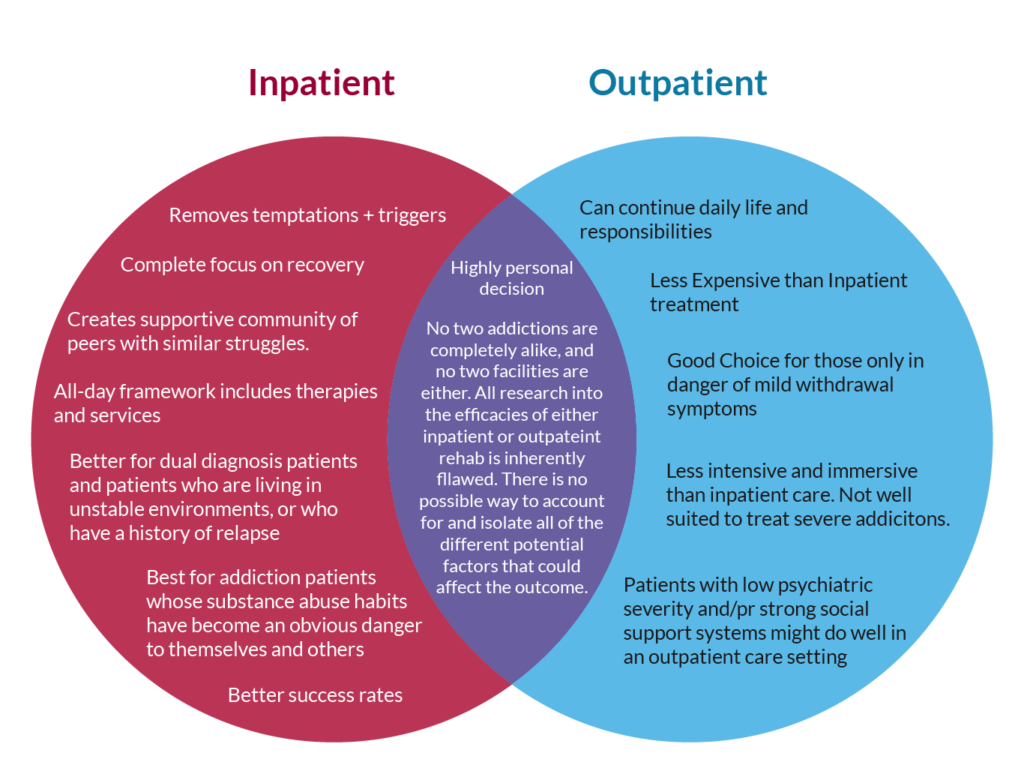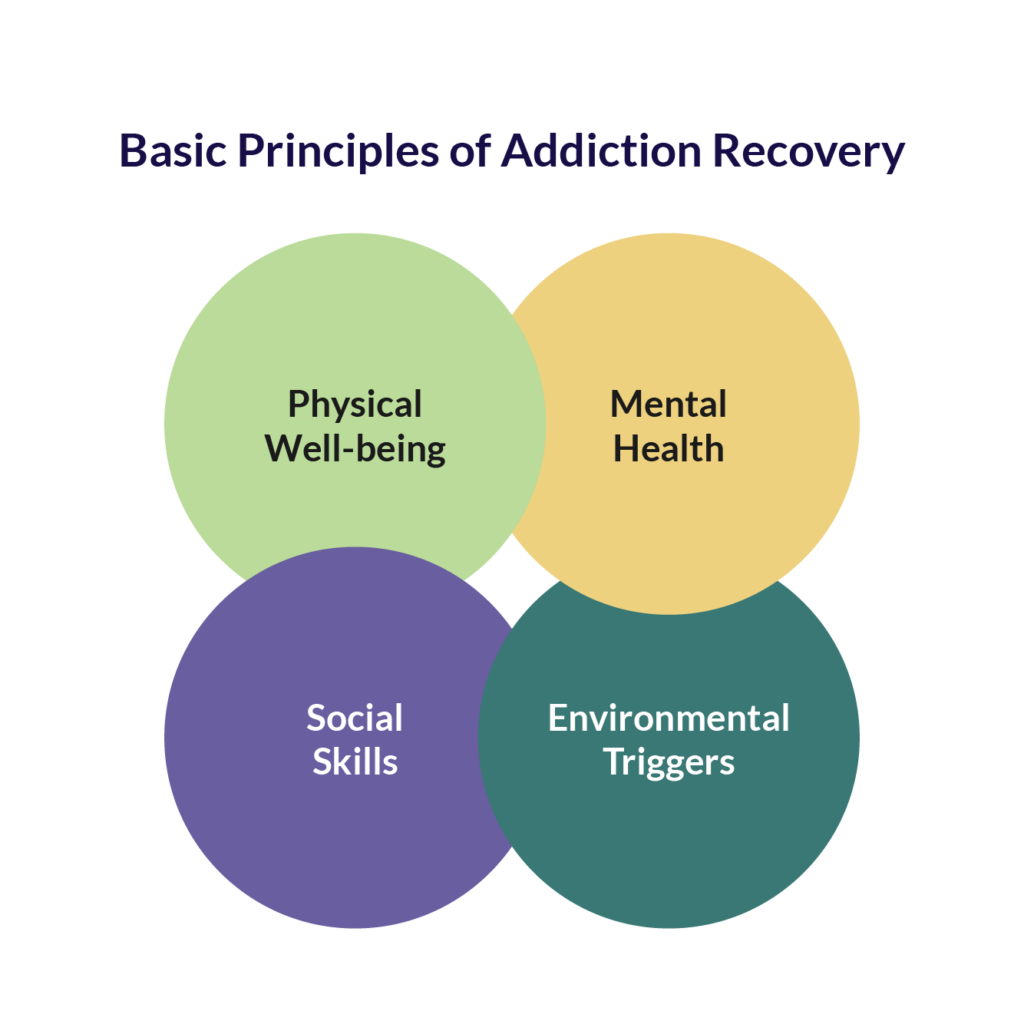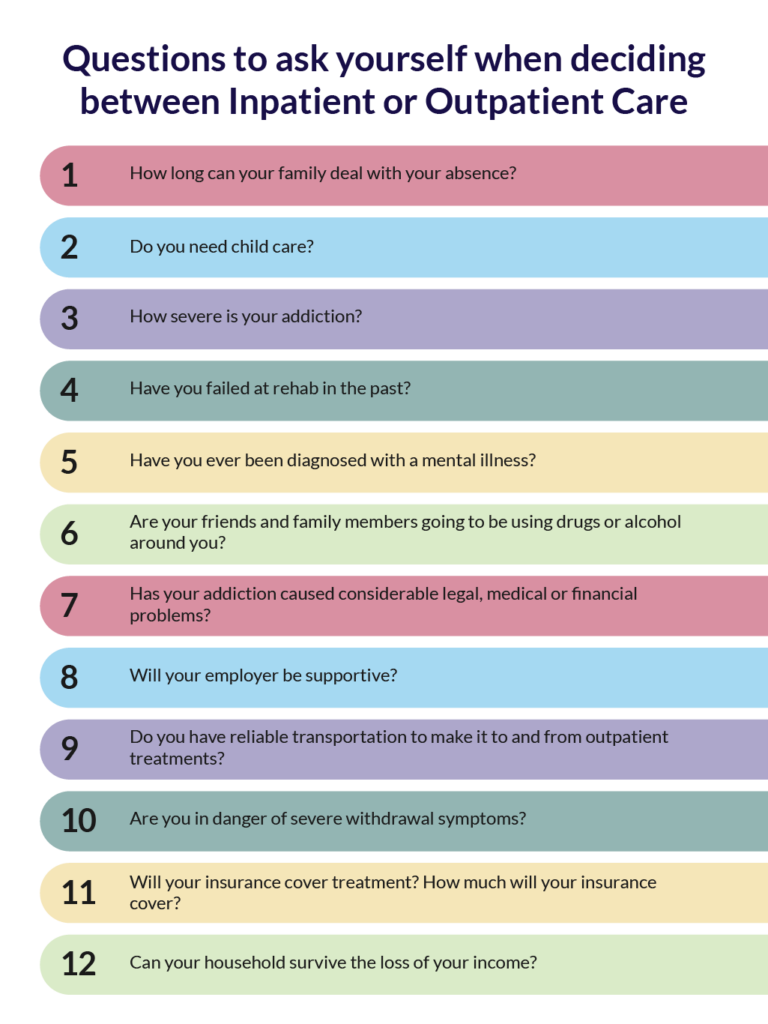When you or someone close to you makes the life-changing decision to fight back against addiction by seeking professional treatment, you’ll have a lot of other decisions to make as well. One of the most important decisions will be choosing between inpatient vs outpatient treatment program.
Inpatient treatment programs refer to a recovery patient receiving treatment while temporarily living at a residential facility.
Outpatient treatment programs refer to a patient receiving treatment at a facility while remaining at home. Both approaches offer distinct advantages and disadvantages.
Primary Differences Between Inpatient and Outpatient Treatment
On its surface, it might appear that the only difference between inpatient and outpatient care treatments is whether you’re home or in an inpatient rehab facility. While this is one of the main differences, this is only part of the story.
An inpatient treatment program removes distractions and temptations from patients by immersing them in a drug- and alcohol-free environment. People being treated in an inpatient rehab facility have no access to drugs and alcohol, are surrounded by medical professionals in the varying stages of recovery and don’t have to contend with the everyday stresses of life.
Outpatient treatment requires patients to report to a treatment facility every weekday. This approach allows much more flexibility for patients who may have conflicting work or familial obligations, but it does not remove drugs or alcohol from their lives.

Understanding The Basic Principles of Addiction Recovery
Before someone can determine what addiction recovery approach is best for them between inpatient and outpatient rehab, it’s important that they understand what rehab must address in order for treatment to be effective. While all outpatient and inpatient treatment centers offer different recovery strategies, in order to be successful they must address certain basic needs. The fundamentals of an effective addiction recovery are laid out by the National Institute on Drug Abuse and include, but are not limited to

Physical Well-being: Addiction patients often enter treatment with extreme physical health deficits. Two of the primary goals of any treatment facility are to begin reversing the physical damage caused by addiction through medical treatment and ease withdrawal symptoms, some of which can be painful and even life-threatening.
Mental Health: In at least half of all drug addiction cases, a preexisting mental health disorder has either caused, exacerbated or contributed to the condition. A complete drug addiction treatment will address mental illness, uncover its role in the development of addiction and teach patients healthier ways to cope with its symptoms.
Social Skills: When a person becomes accustomed to abusing drugs and/or alcohol, it often becomes a crutch or a shield for him or her in social situations. Treatment programs should include therapies that help rebuild social skills.
Environmental Triggers: Nearly every person who has a drug or alcohol addiction has certain environmental triggers that lead them back to substance abuse again and again. For most patients, these triggers are not apparent to them until they are uncovered through addiction therapy.
Benefits of Inpatient Treatment Programs
When facing off inpatient vs outpatient rehab, inpatient treatment possesses a number of advantages over outpatient services. When a person is trying to break any type of habit, it’s best to remove as many temptations from her life as possible. For instance, someone trying to break an addiction to shopping would likely be better served if she weren’t spending any time at the local mall. A person trying to cut down on eating junk food would probably be more successful if all junk food was removed from her home. This is the theory behind inpatient care treatment and why it is recommended for patients with severe addictions to enroll in residential treatment programs. None of the stressful aspects of a patient’s life or any of her triggers can follow her to inpatient treatment.
Inpatient treatment centers around Florida are completely drug- and alcohol-free. Inpatient rehab gives individuals the opportunity to put their everyday lives on hold and focus on their recovery. It also surrounds them with other people going through many of the same struggles, allowing patients to support each other through a peer community during inpatient care.
The immersive, all-day, every day framework also makes it so inpatient care treatment centers can offer several therapies and services. Many residential centers provide 24-hour medical care and dozens of inpatient treatment programs and therapies that a person would most likely not have access to in an outpatient program. This is especially helpful for dual diagnosis patients, those living in unstable environments or people who have a history of relapse. In general, inpatient treatment programs are best for addiction patients whose substance abusing habits have become an obvious danger to themselves and others.
Benefits of Outpatient Treatment Programs
Despite the many benefits of inpatient vs outpatient rehab, outpatient treatment programs or sometimes called ambulatory care may be best for many addicted individuals. Patients with inflexible jobs or with children and other home responsibilities may not be able to take 30-90 days away just to focus on their addiction treatment. A person could be too valuable to his or her family or job to miss an extended period of time. Using an outpatient rehab program in this instance may add a much-needed level of convenience.
Another factor that cannot be ignored is the difference in price between inpatient vs outpatient treatment. While inpatient centers offer much more treatment options than outpatient rehabs, there is a considerable difference in cost. Inpatient treatment can cost as much as $60,000 per month, whereas outpatient treatment generally tops out at around $10,000 per month. For patients without health insurance or with health insurance that won’t cover the cost of residential treatment, an outpatient treatment program may be ideal.
Eliminating the price and work and familial obligations as factors, outpatient treatment is best for people who are only in danger of experiencing mild withdrawal symptoms. Outpatient treatment programs tend to be less intensive and immersive than inpatient rehabs and are not well suited to treat severe addictions.
Inpatient vs. Outpatient: What the Research Says
Several studies have reported better success rates with inpatient rehab than with outpatient rehab success rates. Success in rehab is defined as an individual remaining abstinent over the course of a long-period of time following treatment.
One such study was conducted by the Carrier Foundation in cooperation with the National Institute of Alcohol Abuse on Alcoholism. Researchers reviewed existing literature and conducted a 5-year study that followed 303 patients (183 inpatients and 120 outpatients) and compared their long-term inpatient vs outpatient rehab results.
They found that patients with high psychiatric severity (severe mental illness) and/or poor social support systems were better suited for inpatient care treatment. They also determined that patients who had low psychiatric severity and/or strong social support systems might do as well in an outpatient care setting as they would in an inpatient. Perhaps most importantly, researchers determined that recoveries in outpatient programs were four times more likely to be early treatment failures than in inpatient programs, regardless of psychiatric severity.
A 2009 Switzerland study produced similar results. Researchers followed the progress of 915 patients suffering from substance use disorders at Forel-Hospital (the largest clinic of its kind in the country) between January 2004 and December 2006. They found that at least 75 percent of the patients followed would benefit more from inpatient treatment than outpatient care. The primary reason for this was because of severe psychiatric, somatic or social irregularities.
Being that no two addictions are completely alike and no two facilities are either, all research into the efficacies of either inpatient or outpatient rehab is inherently flawed. There is no possible way to account for and isolate all of the different potential factors that could affect the outcome.
How to Determine What’s Best
Figuring out whether you or your loved one should seek inpatient vs outpatient for addiction treatment is a personal decision. Every one’s situation is different, so applying a blanket statement as to which is the best approach isn’t viable. Here are some questions to ask yourself when making the decision:
1. How long can your family deal with your absence? 2. Do you need child care? 3. How severe is your addiction? 4. Have you failed at rehab in the past? 5. Have you ever been diagnosed with a mental illness? 6. Are your friends and family members going to be using drugs or alcohol around you? 7. Has your addiction caused considerable legal, medical or financial problems? 8. Will your employer be supportive? 9. Do you have reliable transportation to make it to and from outpatient treatments? 10. Are you in danger of severe withdrawal symptoms? 11. Will your insurance cover treatment? How much will your insurance cover? 12. Can your household survive the loss of your income?
Your answers to these questions will help guide you to the right decision for yourself or someone close to you. Ultimately, the decision between inpatient treatment versus outpatient treatment is a decision between freedom and accountability.
At an inpatient clinic or specialty facility, it is nearly impossible for a person to get his or her hands on drugs or alcohol, ensuring that the patient is sober for the duration of treatment. Patients are monitored 24-hours per day and put in a position to thrive in a controlled environment. Meals, recreational activities, medical care and psychological counseling are all provided right on the premises. This level of accountability and protection gives patients a nice head start in recovery and is impossible to replicate in an outpatient care facility. However, being separated from friends and family for weeks and months at a time combined with the cost of inpatient treatment could be deterrents for some.
While an outpatient care facility may not provide all of the protections afforded at inpatient settings, the freedom of being able to go to work and stay at home are enticing draws of outpatient treatment. Patients remain free to live their lives as normally as their condition allows. But, the potential for exposure to drugs and/or alcohol at any time is extremely dangerous for a person trying to overcome addiction.
Choosing the Right Facility is Most Important
Whether you pick inpatient or outpatient treatment, nothing is more important than the facility you choose and the therapies and programs it offers to help defeat addiction. Unfortunately, not all addiction treatment centers are created equally. What you find at one may be completely different from what you find at another. These differences are often strong indicators of whether or not your rehab will be successful or not.
What You Should Be Looking for:

Accreditation: One of the first things you should do when searching for a rehab facility is see if it’s accredited or not. Accreditation ensures that the facility is using evidence-based practices and is one of the largest predictors of success or failure in treatment.

24 Hour Medical Care: Part of the reason why inpatient facilities often produce better results than outpatient rehab centers is the constant surveillance of a primary care physician and medical attention provided. Recovery is typically more successful when you have a team of professionals charged with your care. When you’re dealing with withdrawal symptoms following detox, you may need 24 hour medical attention from your primary care physician.

Mental Health Services: Addiction and mental illness are intertwined. Because of the high likelihood that your addiction has been influenced by a mental illness or trauma, any addiction rehab facility you choose should include an evaluation by mental health experts.

Holistic Treatments: Non-traditional approaches like acupuncture and meditation are being offered at more and more addiction treatment facilities. Not only do they give patients relief during rehab, but they also potentially give patients extra tools to succeed after rehab.

Aftercare: Your journey in recovery is only getting started following rehab. Facilities that offer aftercare services like referrals to 12-step programs, alumni events and transitional living give patients a leg up in the pursuit of long-term sobriety.
At Behavioral Health Centers, we provide our patients with a one-of-a-kind addiction rehab experience. We set ourselves apart by offering dozens of programs and therapies and providing affordable inpatient treatment along the backdrop of our beautiful Florida location as well as outpatient programs for those who can’t stay. Our addiction primary care physicians will help you through every stage of the rehab process and ensure that you have every opportunity to succeed. To learn more about how we can help, contact us anytime at 772-774-3872.
[1] https://archives.drugabuse.gov/NIDA_Notes/NNVol14N5/Tearoff.html[2] https://www.academia.edu/24288999/Inpatient_vs_outpatient_treatment_for_substance_dependence_revisited[4] https://www.nytimes.com/health/guides/disease/treatment/alcoholism/treatment-for-alcoholism.html[5] https://www.academia.edu/24288999/Inpatient_vs_outpatient_treatment_for_substance_dependence_revisited[6] https://ijmhs.biomedcentral.com/articles/10.1186/1752-4458-3-16






